英语学习英语作文120词
howtolearnenglish英语作文
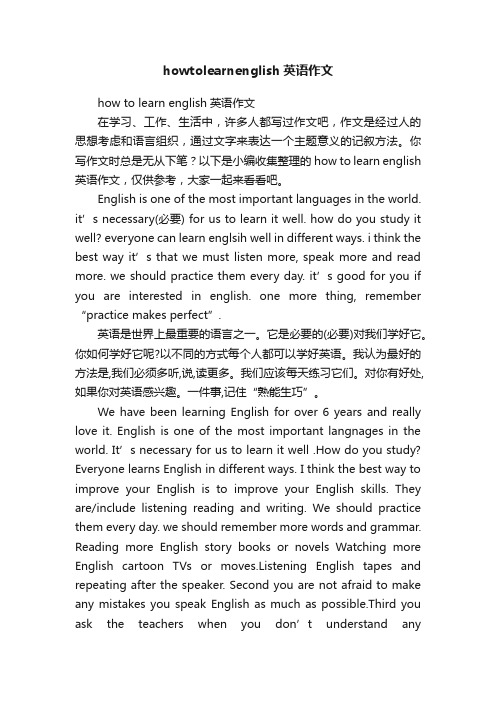
howtolearnenglish英语作文how to learn english英语作文在学习、工作、生活中,许多人都写过作文吧,作文是经过人的思想考虑和语言组织,通过文字来表达一个主题意义的记叙方法。
你写作文时总是无从下笔?以下是小编收集整理的how to learn english 英语作文,仅供参考,大家一起来看看吧。
English is one of the most important languages in the world. it’s necessary(必要) for us to learn it well. how do you study it well? everyone can learn englsih well in different ways. i think the best way it’s that we must listen more, speak more and read more. we should prac tice them every day. it’s good for you if you are interested in english. one more thing, remember “practice makes perfect”.英语是世界上最重要的语言之一。
它是必要的(必要)对我们学好它。
你如何学好它呢?以不同的方式每个人都可以学好英语。
我认为最好的方法是,我们必须多听,说,读更多。
我们应该每天练习它们。
对你有好处,如果你对英语感兴趣。
一件事,记住“熟能生巧”。
We have been learning English for over 6 years and really love it. English is one of the most important langnages in the world. It’s necessary for us to learn it well .How do you study? Everyone learns English in different ways. I think the best way to improve your English is to improve your English skills. They are/include listening reading and writing. We should practice them every day. we should remember more words and grammar. Reading more English story books or novels Watching more English cartoon TVs or moves.Listening English tapes and repeating after the speaker. Second you are not afraid to make any mistakes you speak English as much as possible.Third you ask the teachers when you don’t understand anyknowledge .It’s very good for you if you are interested in Egnlish . You will find studying Egnlish is interesting and helpful. One more thing remember“Practice makes perfect”! I hope everyone makes progress. Thanks!我们已经学习英语6年了,真的'很喜欢它。
如何学好英语英语作文(6篇)
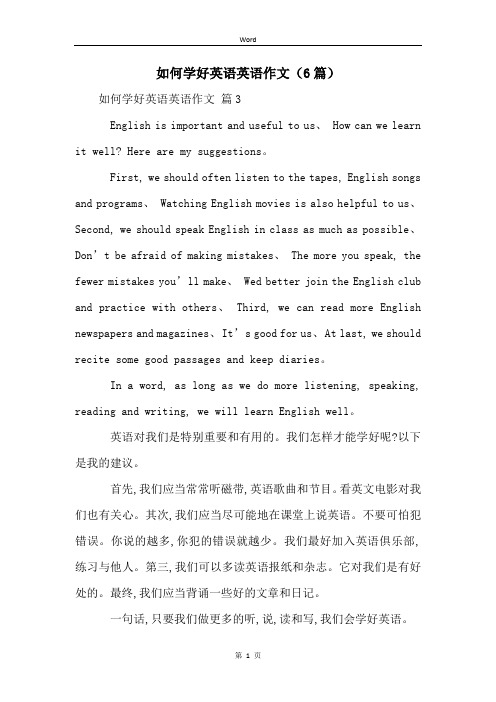
如何学好英语英语作文(6篇)如何学好英语英语作文篇3English is important and useful to us、 How can we learn it well? Here are my suggestions。
First, we should often listen to the tapes, English songs and programs、 Watching English movies is also helpful to us、Second, we should speak English in class as much as possible、Don’t be afraid of making mistakes、 The more you speak, the fewer mis takes you’ll make、 Wed better join the English club and practice with others、 Third, we can read more English newspapers and magazines、It’s good for us、 At last, we should recite some good passages and keep diaries。
In a word, as long as we do more listening, speaking, reading and writing, we will learn English well。
英语对我们是特别重要和有用的。
我们怎样才能学好呢?以下是我的建议。
首先,我们应当常常听磁带,英语歌曲和节目。
看英文电影对我们也有关心。
其次,我们应当尽可能地在课堂上说英语。
不要可怕犯错误。
你说的越多,你犯的错误就越少。
我们最好加入英语俱乐部,练习与他人。
第三,我们可以多读英语报纸和杂志。
我的英语学习经验英语作文120词

我的英语学习经验英语作文120词全文共6篇示例,供读者参考篇1My English Learning ExperienceHi there! My name is Emily and I'm a 10-year-old student in the 5th grade. I've been learning English for a few years now, and it's been quite an adventure! Let me tell you all about my journey with this new language.It all started when I was in the 1st grade. My school introduced English classes, and I remember feeling a mix of excitement and nervousness. The alphabet looked so strange to me, with all those funny-looking letters. But my teacher, Mrs. Johnson, made it fun by teaching us songs and games to help us remember the letters and their sounds.At first, it was really hard. I would get confused between similar-sounding letters like "b" and "p," or "f" and "v." Sometimes, I would accidentally mix up words like "cat" and "act." But Mrs. Johnson was always patient and encouraging. She would gently correct me and remind me to keep practicing.As time went on, I started to get the hang of it. I loved learning new English words and phrases. It felt like a secret code that only a few people in my class could understand. We would practice simple conversations with each other, like "How are you?" and "What's your favorite color?"One of the things that really helped me was watching English cartoons and movies. I would put on the subtitles and follow along, trying to match the words I heard with the ones on the screen. My favorite was "Dora the Explorer" because she would often pause and ask questions, giving me a chance to practice my English comprehension.In the 3rd grade, we started learning how to write in English.I remember feeling frustrated at first because the spelling and grammar rules seemed so different from my native language. But my teacher, Mr. Thompson, encouraged us to keep a journal where we could practice writing about our daily lives and experiences. He would go through our entries and gently correct any mistakes, helping us to improve gradually.As I entered the 4th and 5th grades, my English skills really started to take off. I could read simple books and understand the plot. I could write short stories and poems. And I could even have basic conversations with my English-speaking friends.One of the most exciting moments for me was when my family went on a trip to an English-speaking country. I was able to use my English skills to order food, ask for directions, and even strike up conversations with locals. It made me feel so proud and confident in my abilities.Looking back, I'm so grateful for the opportunity to learn English at such a young age. It has opened up a whole new world of communication, understanding, and cultural appreciation for me. And who knows? Maybe one day, I'll even become an English teacher myself and help other kids embark on their own language-learning journeys.For now, I'll keep practicing, keep learning, and keep exploring this wonderful language. After all, the adventure never ends when you're learning something new!篇2My English Learning ExperienceHi there! My name is Emma and I'm 10 years old. I've been learning English for a few years now and I want to share my experience with you. Learning a new language is not easy, but it can be really fun and rewarding if you put in the effort.My English journey started when I was in first grade. My parents decided to enroll me in an after-school English program because they thought it would be beneficial for my future. At first, I was a bit nervous because I didn't know anyone in the class and I couldn't understand a single word the teacher was saying!The first few months were really tough. I remember feeling frustrated and overwhelmed because everything seemed so foreign to me. The alphabet looked strange, the words sounded funny, and the grammar rules made no sense. But my teacher, Mrs. Johnson, was really patient and encouraging. She used a lot of games, songs, and activities to make the lessons more enjoyable.Slowly but surely, things started to click. I learned the basic greetings, numbers, colors, and simple phrases. I still struggled with pronunciation and grammar, but I could understand and respond to basic instructions in English. My parents were so proud of my progress and that motivated me to work even harder.In second grade, I started reading simple storybooks in English. It was challenging at first, but I loved the colorful illustrations and the interesting stories. I also watched a lot ofEnglish cartoons and movies, which helped me improve my listening skills and vocabulary.By third grade, I was able to have basic conversations in English with my classmates and teacher. We would play language games, act out skits, and do group projects. It was a lot of fun and I didn't even realize how much I was learning.One of my favorite parts of learning English was participating in the annual English Spelling Bee competition at my school. I would spend hours practicing and memorizing words. The feeling of standing on stage and spelling words correctly was incredibly satisfying.In fourth grade, I joined the school's English Drama Club. We would put on short plays and skits entirely in English. It was a wonderful opportunity to improve my speaking, acting, and confidence skills. I made a lot of new friends who shared my passion for the language.Now, as a fifth-grader, I can confidently say that I'm fluent in English. It's become a part of my daily life. I read English books, watch English movies, and even think in English sometimes. It's amazing how far I've come since those first overwhelming days in first grade.Learning English has opened up so many doors for me. I can communicate with people from around the world, access a wealth of information and resources, and explore different cultures and perspectives. It's truly a valuable skill that has enriched my life in countless ways.My advice to anyone learning a new language, especially English, is to be patient, stay motivated, and have fun with the process. Immerse yourself in the language as much as possible by reading, listening, speaking, and writing. Don't be afraid to make mistakes – that's how you learn and improve.I'm so grateful for the opportunity to learn English and I'm excited to continue building on my skills. Who knows, maybe one day I'll become an English teacher myself and inspire others the way Mrs. Johnson inspired me.Well, that's my story! I hope you found it interesting and maybe even a little bit motivating. Remember, with dedication and perseverance, anything is possible – even mastering a new language!篇3My Experience Learning EnglishHi there! My name is Emma and I'm 10 years old. Today I want to tell you all about my experience learning English. It has been quite a journey so far!I started learning English when I was around 5 years old in kindergarten. At first, it was really hard and kind of confusing. See, my parents don't really speak English at home - we speak Chinese. So English was completely new to me when I started school.In kindergarten, we started off super basic. Like learning the English alphabet, numbers 1-10, colors, shapes, and simple words like "apple", "ball", "cat", etc. My teacher would use a lot of picture books, songs, games and activities to help us learn. I remember struggling a lot with the pronunciation in the beginning. Words like "three" and "thank you" were really hard for me to say properly.Then in 1st grade, we started putting words together into sentences. That's when English grammar started coming into play, like using "a" versus "the", singular versus plural, and basic verb tenses. One thing I found really difficult was the idea of putting spaces between words when writing in English. In Chinese, we just write one string of characters, so it was weird to have to put spaces between each word in English!By the time I got to 2nd and 3rd grade, we were reading simple books, writing short paragraphs, having basic conversations, and learning more advanced grammar concepts. Reading was probably the hardest part for me - having to sound out words and understand what they meant at the same time. My teacher started using more games and hands-on activities to keep us engaged.Now that I'm in 4th grade, we're stepping it up a level. We have English class every day where we read longer texts, write essays and stories, learn public speaking, and study more complicated grammar rules. Just this year we started learning about gerunds, perfect verb tenses, conditional sentences - my brain hurts just thinking about it all! But I've come a long way from those early kindergarten days.One thing that has really helped me is watching篇4My Journey Learning EnglishHi there! My name is Lily and I'm 10 years old. I've been learning English for a few years now and I want to tell you all about my experience. Get ready for an exciting story full of ups and downs, struggles and triumphs!It all started when I was in 1st grade. My parents enrolled me in an after-school English class. I was really nervous on the first day. I didn't know any English at all except for maybe "hello" and "goodbye." The teacher seemed nice but I was still pretty scared.Those first few months were really tough. I just could not wrap my head around this strange new language. Why did words have to be spelled so weirdly? And don't even get me started on pronunciation - English seemed to have zero rules when it came to that! I would listen to the teacher and my classmates and feel like they were speaking gibberish.I started to get really frustrated and wanted to just give up. Learning English was way too hard! But my parents kept encouraging me. "Just keep practicing," they would say. "It will start to click eventually." I wasn't so sure, but I decided to trust them and stick with it.Slowly but surely, things did start getting a little easier. Reading kids' books helped a lot, even if I only understood like 25% of the words at first. Watching TV shows and movies in English was fun too, although I had to keep hitting rewind and relying heavily on subtitles. Repetition and immersion were key.There were plenty of embarrassing moments along the way too. Like the time I thought I was saying "I'm sorry" but I hadtotally botched the pronunciation and ended up saying something rude instead! Or when I misunderstood the lunch menu and accidentally ordered a giant plate of smelly cheese. Yuck! Mistakes were inevitable but laughing about them made the journey more fun.As the years went by, English became more and more familiar to me. By 3rd grade, I could understand most of what my teacher said during our English lessons. By 4th grade, I was reading simple chapter books without too much difficulty. And now that I'm in 5th grade, I can carry on conversations with my English-speaking friends pretty smoothly. There's still plenty of room for improvement, but I'm really proud of how far I've come.Learning a new language is a marathon, not a sprint. It takes patience, dedication, and a willingness to make mistakes along the way. It certainly wasn't easy, but exploring the world of English has been an incredibly rewarding experience. Who knows, maybe I'll pick up a third language next! The journey never ends when you're a language learner. But I'm OK with that - in fact, I wouldn't have it any other way.篇5My Journey Learning EnglishHi there! My name is Sam and I'm 10 years old. I've been learning English for a few years now and I wanted to share my experience with you. It's been quite a ride, let me tell you!It all started when I was in 1st grade. My parents decided it would be really important for me to learn English since it's such a global language. At first, I was a little nervous. English seemed so different from my native language with all those crazy spelling rules and funny pronunciations. But my parents assured me it would be fun and open up a whole new world for me.My first English lessons were through an after-school program. We started off really basic, learning the alphabet and simple words like "cat", "dog", "apple". My teacher was really nice and made the classes engaging with songs, games and activities. I loved when we played games like "Simon Says" or did arts and crafts projects while practicing our English vocabulary.As I got older and moved up in grades, English class got a bit more challenging. We started learning grammar rules, like how to properly structure sentences. Man, memorizing all those verb tenses was no joke! We also read simple stories and did comprehension exercises. My biggest struggle was with pronunciation - some words were just so weirdly spelled compared to how they sounded.What really helped me was watching movies, shows and YouTube videos in English. At home, my parents had me watch with English subtitles so I could read along. My favorites were animated Disney movies since the language was pretty simple to follow. I also started reading children's books in English during my free time. The more I immersed myself in English media, the more it clicked in my brain.Eventually, I started taking extra English classes and doing tutoring sessions to take my skills to the next level. We did more advanced reading, writing exercises, public speaking practice and even started basic coding and typing lessons - all in English! It was intense but so rewarding. By the time I reached 4th grade, I was conversing, reading and writing in English at close to a fluent level.One of the coolest experiences was when I went on a school trip to an English summer camp. For one whole week, we had to speak only English - even just casually with friends. It was difficult at first, but pushed me to improve my listening and speaking abilities immensely. Playing games, doing activities and living together 24/7 with other English learners was an awesome total immersion experience.I also started making English-speaking friends online through language exchange communities. We'd chat via text or voice call and teach each other our respective languages. It was fun cultural exchange! They helped me understand casual English slang and idioms that you don't really learn in textbooks.Now, after years of consistent practice, English feels like a second first language to me. Don't get me wrong, there are still areas I struggle with, like understanding thick accents or using proper academic writing style. But overall, I'm so glad I put in the hard work to learn this incredibly useful language.English has opened up so many doors for me in terms of media, travel, education and future career opportunities. My advice to other kids learning it would be: immerse yourself as much as possible through reading, watching, listening to English content. Practice speaking out loud, even if you feel shy or make mistakes at first. And most importantly, have fun with it and don't get discouraged! Trust me, all the effort pays off. Who knows, maybe you'll even get to write a super long essay about your language learning experience someday!篇6My English Learning ExperienceHi! My name is Emma and I'm 10 years old. I go to Oakwood Elementary School and I'm in 4th grade. Today I want to tell you all about my experience learning English so far!I've been learning English for as long as I can remember. My parents always spoke to me in English at home since I was a baby. They said it was important for me to learn English well because it's such an important language used all around the world. At first, English was my only language. It felt really natural and easy.When I started preschool though, that's when things got a bit tricky! A lot of the other kids spoke different languages at home like Spanish, Chinese, Arabic and more. I remember feeling confused at first when they would talk to each other in those other languages during playtime. It was like they were speaking secret codes that only they could understand!Thankfully, my preschool teachers were really great about making sure all of us learned English. We had daily circle time where we sang songs and did fun activities all in English. We also started learning how to read and write the alphabet and simple words. It was a whole new world opening up!In kindergarten, we really ramped up the English learning. We had proper English lessons every day where we practiced reading, writing, listening and speaking. I remember doing a lotof repetition exercises where we would go around the room taking turns reading sentences or saying new vocabulary words. It felt kind of silly at the time, but I realized later that it really helped drill those basics into our brains.As I got into 1st, 2nd and 3rd grade, the English lessons got even more intense. We started reading entire books, writing longer stories and essays, and learning all the grammar rules. Things like verb tenses, subject/verb agreement, punctuation - it could all get really confusing sometimes! But my teachers always found fun ways to make it more interesting, like doing skits, playing games, or watching short videos.One of the things I'm most grateful for is that my parents kept speaking to me in English at home and had me practice constantly. They read me bedtime stories, helped me with my homework, and only allowed English TV shows and movies. I definitely got sick of it sometimes and just wanted to take a break in my native language. But looking back now, I realize how lucky I was to get that full immersion.Another big help was using educational apps, websites, and games designed for learning English. My favorites were online reading games where you got to explore animated worlds and collect prizes for good reading comprehension. I would playthose for hours! There were also really cool apps that turned grammar practice into fun characters and stories. Way more engaging than just doing worksheets.Now that I'm in 4th grade, I feel pretty confident with my English skills for my age. I can read and write at a high level and I communicate smoothly in English with my teachers and classmates. It's become like a second first language to me.But overall, my English learning experience so far has been incredibly positive. Having parents who started me early with full immersion was hugely beneficial. My schools have also done a fantastic job with their English curriculums and making it interactive. And with technology these days, there are so many fun resources to supplement the classroom learning.If you're a kid learning English, I highly recommend sticking with it and taking advantage of every opportunity to practice. It may feel hard at times, but it's such an amazing gift to become fluent in a truly global language. Pretty soon, you'll be reading, writing and speaking English like you were born to do it. The world will open up for you in amazing ways!Those are my thoughts so far after 10 years of being an English learner. I'm excited to see how my skills continuegrowing over the years ahead. Thanks for reading, and happy learning!。
大学英语学习作文120词
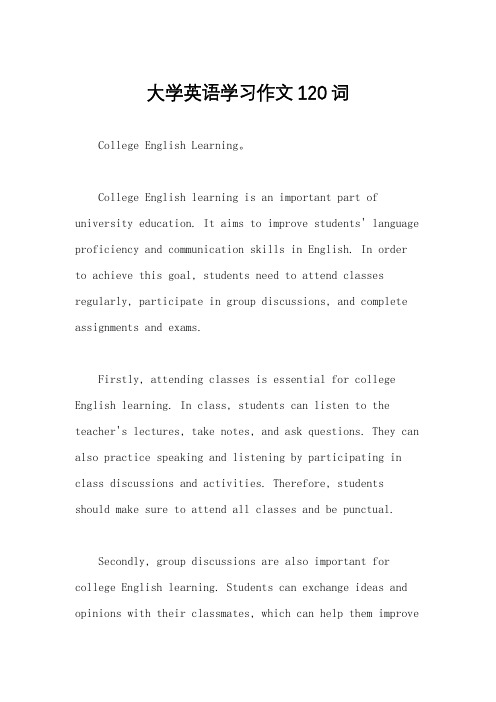
大学英语学习作文120词College English Learning。
College English learning is an important part of university education. It aims to improve students' language proficiency and communication skills in English. In order to achieve this goal, students need to attend classes regularly, participate in group discussions, and complete assignments and exams.Firstly, attending classes is essential for college English learning. In class, students can listen to the teacher's lectures, take notes, and ask questions. They can also practice speaking and listening by participating in class discussions and activities. Therefore, students should make sure to attend all classes and be punctual.Secondly, group discussions are also important for college English learning. Students can exchange ideas and opinions with their classmates, which can help them improvetheir communication skills and broaden their perspectives. In addition, group discussions can also help students to understand different cultures and customs.Thirdly, completing assignments and exams is crucialfor college English learning. Assignments can help students to practice writing, reading, and listening skills, while exams can assess their language proficiency and knowledge. Therefore, students should take their assignments and exams seriously and prepare well in advance.In conclusion, college English learning is a challenging but rewarding process. By attending classes, participating in group discussions, and completing assignments and exams, students can improve their language proficiency and communication skills, which will benefit them in their future careers and personal lives.。
学习英语的英语作文及翻译
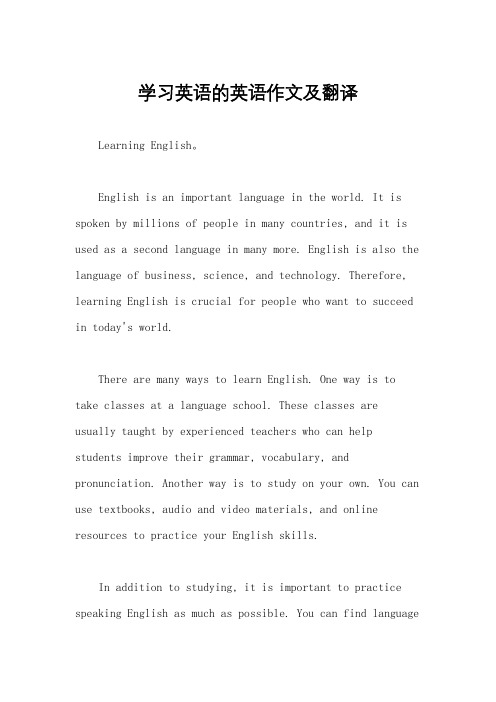
学习英语的英语作文及翻译Learning English。
English is an important language in the world. It is spoken by millions of people in many countries, and it is used as a second language in many more. English is also the language of business, science, and technology. Therefore, learning English is crucial for people who want to succeed in today's world.There are many ways to learn English. One way is to take classes at a language school. These classes are usually taught by experienced teachers who can help students improve their grammar, vocabulary, and pronunciation. Another way is to study on your own. You can use textbooks, audio and video materials, and online resources to practice your English skills.In addition to studying, it is important to practice speaking English as much as possible. You can find languageexchange partners or join English conversation clubs to improve your speaking skills. You can also watch English movies and TV shows, listen to English music, and read English books to immerse yourself in the language.Learning English can be challenging, but it is also rewarding. It can open up new opportunities for you, both professionally and personally. It can also broaden your horizons and allow you to connect with people fromdifferent cultures.In conclusion, learning English is essential in today's globalized world. Whether you choose to take classes or study on your own, it is important to practice speaking and immerse yourself in the language. With dedication and hard work, anyone can become proficient in English and reap the benefits it offers.学习英语。
英语学习充满了乐趣英语作文

英语学习充满了乐趣英语作文英语学习充满了乐趣英语作文I love learning English, because English is the most widely spoken language in the world. It is used by many countries all over the world.If you want to find a nice job, you need to be good at English. If you don't know many keywords and dialogues in English, you'll have to spend a lot of time looking them up in an English dictionary. So, we must try harder to learn English.Now, I'll become a junior high student. I'll try to read magazine zrticles in English every day. In fact, learning English is full of fun. It's quite like learning Chinese. Just open your mouth and say something in English. All in all, it's interesting for everyone to learn English.【参考译文】我酷爱学习英语,因为英语是世界上应用最广泛的语言。
全世界很多国家都使用英语。
如果你想找到一份理想的工作,你就需要很好的掌握英语。
如果你掌握不了很多的英语词汇和对话,你将会花费大量时间去查找字典。
关于怎样学好英语英语作文范文(精选16篇)
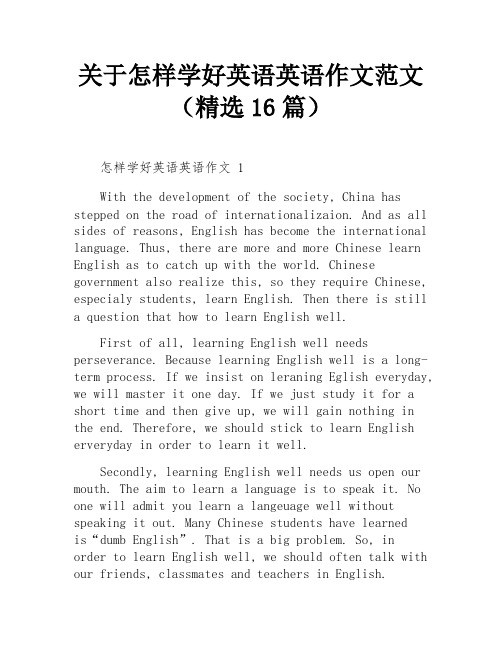
关于怎样学好英语英语作文范文(精选16篇)怎样学好英语英语作文 1With the development of the society, China has stepped on the road of internationalizaion. And as all sides of reasons, English has become the international language. Thus, there are more and more Chinese learn English as to catch up with the world. Chinese government also realize this, so they require Chinese, especialy students, learn English. Then there is still a question that how to learn English well.First of all, learning English well needs perseverance. Because learning English well is a long-term process. If we insist on leraning Eglish everyday, we will master it one day. If we just study it for a short time and then give up, we will gain nothing in the end. Therefore, we should stick to learn English erveryday in order to learn it well.Secondly, learning English well needs us open our mouth. The aim to learn a language is to speak it. No one will admit you learn a langeuage well without speaking it out. Many Chinese students have learnedis“dumb English”. That is a big problem. So, inorder to learn English well, we should often talk with our friends, classmates and teachers in English.Thirdly, the best way to master a language is tobe personally on the scene. So I advice those people who have condition go abroad for a while. When they come back home, their oral English must have improved.To sum up, learning English well is not easy. But we can take masures to make it done through perseverance, talking and going abroad.随着社会的发展,中国已经踏上了国际化的道路。
学习英语作文
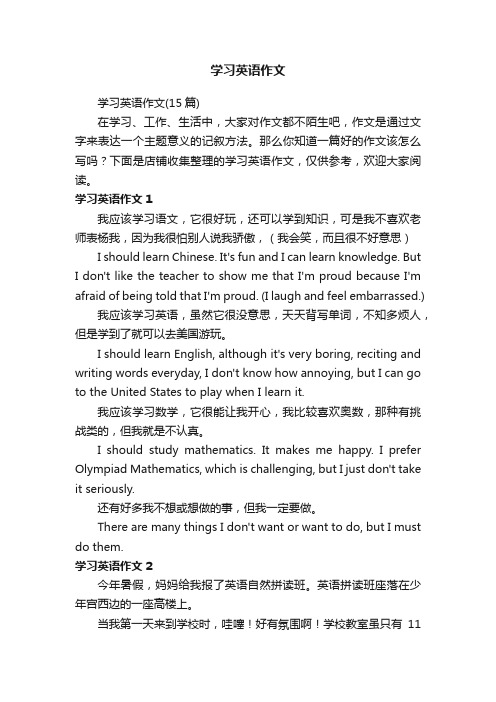
学习英语作文学习英语作文(15篇)在学习、工作、生活中,大家对作文都不陌生吧,作文是通过文字来表达一个主题意义的记叙方法。
那么你知道一篇好的作文该怎么写吗?下面是店铺收集整理的学习英语作文,仅供参考,欢迎大家阅读。
学习英语作文1我应该学习语文,它很好玩,还可以学到知识,可是我不喜欢老师表杨我,因为我很怕别人说我骄傲,(我会笑,而且很不好意思)I should learn Chinese. It's fun and I can learn knowledge. But I don't like the teacher to show me that I'm proud because I'm afraid of being told that I'm proud. (I laugh and feel embarrassed.) 我应该学习英语,虽然它很没意思,天天背写单词,不知多烦人,但是学到了就可以去美国游玩。
I should learn English, although it's very boring, reciting and writing words everyday, I don't know how annoying, but I can go to the United States to play when I learn it.我应该学习数学,它很能让我开心,我比较喜欢奥数,那种有挑战类的,但我就是不认真。
I should study mathematics. It makes me happy. I prefer Olympiad Mathematics, which is challenging, but I just don't take it seriously.还有好多我不想或想做的事,但我一定要做。
- 1、下载文档前请自行甄别文档内容的完整性,平台不提供额外的编辑、内容补充、找答案等附加服务。
- 2、"仅部分预览"的文档,不可在线预览部分如存在完整性等问题,可反馈申请退款(可完整预览的文档不适用该条件!)。
- 3、如文档侵犯您的权益,请联系客服反馈,我们会尽快为您处理(人工客服工作时间:9:00-18:30)。
英语学习英语作文120词篇一:英语作文词汇常见词汇替换1. “好”:good替换为:fine,OK,nice,great,excellent,wonderful,terrific,fabulous,fantastic,splendid,extraordinary,outstanding,incredible,amazing2. “大”:big替换为:tremendous,titanic,gigantic,vast,huge,large,grand,great,giant,immense,colossal building3. “很、非常”:very替换为:I am terribly sorry.实在抱歉。
.那部电影非常精彩。
.他对我非常亲切。
.听到这个消息我们大为震惊。
.这个故事很有意义。
.我很想换个工作。
.老板对我的工作很满意。
.听到这个消息我们极其兴奋。
.演出十分精彩。
.我说得十分清楚。
.我到家时累到了极点。
4. “喜欢”:like替换为:care for, be crazy about, be fond of, be mad about, be keen on, beaddicted to, be hooked on, have a passion for5. “严重的”:serious替换为severe6. “贫穷的”:poor替换为needy“富有的”:rich替换为wealthy7. “有益的”:good替换为beneficial8. “不好的,不受欢迎的”:bad替换为undesirable9. “重要的”:important替换为fundamental /significant10. “有关的”:related替换为relevant11. “惊人的,非凡的”:surprising替换为extraodinary/amazing12. “解决”:solve替换为cope with13. “方法,方案”:way替换为approach / method14. “老人”:old people/the old替换为the aged“青少年”:the young替换为adolescents15. “同意”:agree with替换为subscribe to16. “获得知识”:gain knowledge替换为acquire knowledge17. “引起”:cause替换为contribute to/lead to18. “许多、大量”:a lot of 替换为a vast amount of/alarge number of/ a great deal of/ a large quantity of19. “想要”:want/look for 替换为seek/be long for/belong to do20. “普通学生”:ordinary student 替换为average student21. “坐”:sit 替换为seat22. “应该”:should 替换为ought to /be supposed to23. “读书”:read 替换为cover24. “即将到来”:be coming soon 替换为around the corner25. “谈到、说到、提到”:talk about/of 替换为mention/refer to26. “不得不”:have to do 替换为can not help but do27. “帮忙”:help 替换为do sb. a favor28. “尽力做”:try one’s best to do替换为spare no efforts todo29. “偶尔、有时”:sometimes替换为once inwhile/occasionally30. “实际上”:in fact替换为as a matter of fact31. “完全”:complete替换为absolute, perfect, entire32. “高兴,快乐”:delighted, delightful, pleased, pleasing, charmed, pleasant,cheerful, cheering, merry, happy, gratified, glad, gay, agreeable, friendly,content, satisfied, light-hearted, joyful33. “真的”:true, truthful, faithful, genuine, real, trustworthy篇二:英语作文中常用连接词及句式Lihua, a student from Yucai Middle School, who is 180cm tall with black hair was born on Oct 1st 1989. His family, which is at 138, Yucai Road, Guangzhou, China, has get three people. Both hisparents are teachers. Lihua has two hobbies, which are collecting stamps and coins. His knows English well and can speak perfect English.英语作文中常用连接词及句式一) 连接词(1)表选择关系或对等关系的连接词:either…or…,neither…nor, or, as well as…, and, both…and…。
(2)表因果关系或对等关系的连接词:therefore, so, as a result, as the result of …,because of, due to …,owing to, thanks to ,for the sake of(为了)等。
(3)表时间顺序的连接词:the moment, as soon as, at first, then, later, meanwhile(同时), at the beginning, in the end, before long, for the first(second…)time, the minute等。
(4)表转折关系的连接词:yet(然而, 但是), and yet, but , while, on the contrary, on the other hand, however, at the same time(然而)by the way 顺便说I am afraid 我恐怕in my opinion 依我看来to tell the truth 说实话to be honest 诚实地说in face 事实上等。
(5)表解释说明的连接词:that is, that is to say, in other words, such as, for instance, take…for example(拿……来说)and so on, etc. and the like,like 像……, namely 即……according to(根据) 等。
(6)表递进关系的连接词: above all (首要的是;最重要的是)not only…but (also), what’s more更重要地是, what's worse, besides, in addition(另外) apart from (除了……之外)worse still, moreover(此外, 而且), in fact/ as a matter of fact 事实上in that case 那样的话等。
(7)表示总结的连接词:in a word, on the whole(总的来看〔说〕), in short, briefly, in brief, to sum up= in summary, in all,all in all等。
(8) 表示列举和时序first, second, third…finally at first at lastfirstly, secondly, thirdly…finallyfirst of all, next then, lastlyin the first place ... and in the second place...,for one thing…for another…at the same time as follows列举如下(9)表强调的关联词do, indeed, actually, really, truly, especially, to be honest, to be frank, in particular, above all, obviously(二)、常用句型1、be worth doing 值得做……2、be busy doing 忙着做……3、too…to do 太……而不能做……4、so+adj./adv. as to do 如……以致于做5、It takes sb. some time to do sth. 花某人……时间做某事6、sb.spends some time doing sth. 某人花……时间做某事7、It is+adj.+for sb. to do sth. 某人做某事是……8、It's up to sb. to do sth. 应由某人做某事9、sb. have some difficulty/ trouble in doing sth. 某人做某事很费劲10、The more…the more…越……越……11、It's no good/use doing sth. 做某事没好处/用处。
12、sb.can do nothing but do sth.=have no choice but to do 别无他法,只能做某事13、There be/lie/stand/live…有……14、be about to do sth. when…正要做某事这时……15、It was not long before…不久就……It will not be long before…要不了多久就……16、It is+一段时间+since…自……以来,有……时间了17、It is said that…据说……18、not…until/till…直到……才19、祈使句+and/or+分句(将来时)20、主语+find/consider/think+it+形容词或名词+不定式21、so+adj./adv.+that 如此……以致于such+n.+that…22、why not do sth 为什么不做……呢?why do sth. 为何做……?23、主语+hit/strike/beat/touch/grasp/seize/catch…+sb.介词+the+表示身体部位的名词24、It's time to do sth./ It,s time+sb.did sth. 到做某事的时间了25、sb. devote oneself/one's life to sth./doing. 致力于做某事26、It happened that,…/sb.happened to do sth. 碰巧……27、It is/ was+被强调部分+that/who…28、I don't think/believee/suppose/expect+that 从句否定前移29、would like to do 愿做某事feel like doing 想做某事had better (not) do sth 最好(不)做某事would rather do 宁愿做……30、There is no doing sth. 没必要做……31、主语+have no idea+从句不知道……32、I doubt whether+从句我怀疑……I don't doubt that+从句我不怀疑……33、no matter when/where/what/who/whether/how+从句+主句无论……34、what/who/where/when…do you think…你认为什么/谁/哪里/什么时候……35、used to do 过去常做某事be used to doing 习惯于做某事36、the moment…一……就……immediately as soon as…从句+主句37、no sooner…than/hardly…when 一……就……38、It is possible/probable/likely that…可能……39、Do you mind if I do?/Would you mind if I did? 我做某事你介意吗?40、wish sb.+n./abj 祝愿某人……(三)注意以下过渡词的用法1、表示时间的af first 起初next 接下来then 然后after that 那以后later 后来soon 不久soon/shortly after ……之后不久finally 最后in the end 最后eventually 最终at last 终于lately 近来recently 最近since then 自从那时起after that 那以后in no time 不一会儿after a while 一会儿afterward 后来to begin/start with=in the first place 首先、第一点immediately 立即、马上meanwhile=in the meantime=at the same time 在此期间、同时earlier, until now 直到现在suddenly=all of a sudden 突然as a young man 当……是个年轻人的时候at the age of…在……岁的时候as early as 早……的时候as soon as 一……就……before, the other day 几天前early in the morning 大清早after/before dark 天黑后/前one day 有一天one afternoon 一天下午one morning 一天早晨2、表示空间的to the right/left 朝右/左on the rinht/left 在右/左边in the middle of 在中间in front of 在前面in the front of 在前面at the back of 在后面at the bottom of 在底部on the edge of 在……的边上on top of 在……的顶部opposite to 与……相对close to 靠近near to 在……附近next to 与……相邻under 垂直在下over 垂直在上below 在下方above 在上方across 在……的另一边around 在周围behind 在后before 在前against 靠着、抵着further on 再往前3、表示列举和时序first, second, third…finally firstly, secondly, thirdly…finally first of all, next then, lastlyfor one thing…for another…at the same timeat firstat last4、表示列举for example 例如:……namely 即……for instance 例如:……that is (to say) 也就是说such as 如……take…for example 拿……来说like 像……5、表示比较或对比like 像unlike 不像similarly 同样地in the same way 以相同的方式compared to 与……相比while 而still=nevertheless 然而on the contrary 正相反different from 与……不同on (the) one hand…on the other hand 一方面……另一方面in contrast with 与……成对比6、表示增补and 而且both…and 不但……而且not only…but also 不但……而且as well as 不但……而且also=besides=furthermore=more over 此外、而且in addition 并且apart from 除了……之外what's more 而且、更重要的for another 另一方面worse still=what's worse=to make matter worse 更糟糕的是including 包括7、表示因果because 因为since 既然as 由于now that 既然therefore 因此thus 这样so 所以as a result (of) 结果because of=on account of 因为thanks to 多亏、由于for this reason 由于这个原因if so 如果这样if not 如果不是这样8、表示目的for this purposein order to doso as to doso that…in order that…9、表示让步though/althoughno matter+疑问句in spite ofwhatever/however/whoevereven if/ even though篇三:英语写作作文实用链接词因果关系原因:后加从句不可加短语:as,since后只加名词:due to,owing to结果Hence, thus,therefore,as a conseq(本文来自: 千叶帆文摘:英语学习英语作文120词)uence,as a result,consequently,so that目的thereby-以此达到什么样的目的,不可用于句首,后加ving **For the sake of=in order to help, improving or bring advantage to......通过。
